Could your sleeping position be affecting your memory? From animals to humans, sleeping is a very important part of an individual’s life. Sleep has been determined to be the state that the body and brain needs to process and reset from the day’s activities. If one becomes an insomniac or starts to lack sleep the brain doesn’t have a chance to rest and restore. They can start to hallucinate and cannot determine from what is real and what is not. It would seem they are in a dream state and as a result their reflexes can be quite slow and delayed.
It has been found is that during the day the brain is constantly working and processing all the sensory inputs (visual, auditory, tactile, olfactory, gustatory, and proprioception) and accumulating metabolic waste. When an individual is asleep they are able to reboot their hard drive/brain and let it restore itself. What has now emerged from Stony Brook University in New York is that the position you sleep in affects more than just your neck and spine. It has been shown that side sleeping is more effective than back or stomach sleeping to help remove brain waste and may just be an important practice in reducing your chances of developing Alzheimer’s, Parkinson’s and other neurological diseases.
They utilised MRI to visualise the brain’s glymphatic pathway, which is a complex system that clears wastes and other harmful chemical solutes from the brain. They showed that the lateral sleeping position is commonly adopted in humans and animals (even in the wild) was the most effective in opening the glymphatic system and removing this waste.
This information adds further support to the concept that sleep sub-served a distinct biological function of sleep and that is to clean up the mess that accumulates from being awake. Many types of dementia are linked to sleep disturbances, including difficulties from falling asleep. It is also acknowledged that theses sleep disturbances may accelerate memory loss in Alzheimer’s disease.
To start helping your brain and maintaining the neural connections try falling asleep on your side and of course use a good supportive pillow for the neck. If you have any questions about your sleeping position please contact the team at Neurohealth.
If you would like more information or would like to book an appointment at Neurohealth Chiropractic – please call the clinic on 9905 9099 or email us admin@neurohealthchiro.com.au or fill in the contact form from our website www.neurohealthchiro.com.au
Sign up to receive Neurohealth Chiropractic’s Free monthly health newsletter on the Right Hand Side of this page. Filled with great information and lots of easy health tips to keep you at Optimal Health!
This article is written by Dr. Steven Cannon, Chiropractor – Neurohealth Chiropractic




